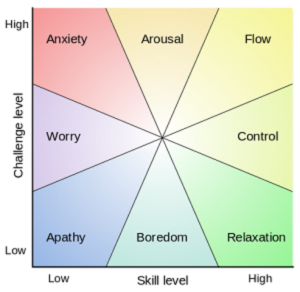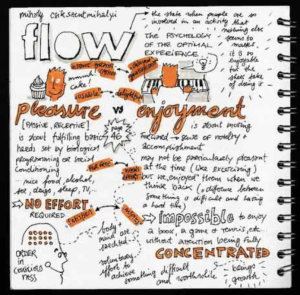The Flow Method
“The best moments in our lives are not the passive, receptive, relaxing times… The best moments usually occur if a person’s body or mind is stretched to its limits in a voluntary effort to accomplish something difficult and worthwhile.” ~ Mihaly Csikszentmihalyi (1990, p. 3)
The key to happiness consists in how we invest our psychic energy. When we focus our attention on a consciously chosen goal, our psychic energy literally “flows” in the direction of that goal, resulting in a re-ordering and harmony within consciousness.
OUR GOAL AT WHITE ROCK NATUROPATHIC: is to make life and health easier so that you can access and engage in FLOW in your own life more often, more deeply, more fully. By helping you address your health concerns and those obstacles (physical, mental, emotional) that are affecting your life, we are then able to help coach you as to how to re-direct your health, energy and focus towards maximizing FLOW in your life on a daily basis.
- Cultivating more FLOW in everyday life begins with recognizing in what form FLOW IS CURRENTLY ACCESSIBLE and through which activities it may be best supported to occur more often, and then,
- ADDRESSING OBSTACLES preventing it to occur more repeatedly (physically, mental-emotionally, and relationship wise), and lastly,
- Supporting the DEVELOPMENT OF HABITS which will allow Flow to occur more reliably in everyday life.
What is Flow?
A flow state, also known as being in “the zone”, is the mental state in which a person performing an activity is fully immersed in a feeling of energized focus, full involvement, and enjoyment in the process of the activity.
In essence, flow is characterized by the complete absorption in what one does for its own sake, and a resulting loss in one’s sense of ego, space and time. Your whole being is involved, and you’re using your skills to the utmost.
Flow experiences can occur in different ways for different people. Some might experience flow while engaging in a sport such as skiing, tennis, soccer, dancing, or running. Others might have such an experience while engaged in an activity such as painting, drawing, or writing. These moments of flow often occur when you are engaged in an activity that you enjoy and in which you are quite skilled.
Cziksentmihalyi defines flow as “a state in which people are so involved in an activity that nothing else seems to matter; the experience is so enjoyable that people will continue to do it even at great cost, for the sheer sake of doing it.” (Cskikszentmihalyi, 1990, p.4) He identifies a number of different elements involved in achieving flow:
- There are clear goals every step of the way (that are attainable and one’s skills are well matched) – You know exactly what you want to do in flow.
- There is immediate feedback to one’s actions – You can instinctively adjust/adapt on the road of your goal.
- There is a balance between challenges and skills – You feel a balance between your skill level and challenge of the skill.
- Action and awareness are merged – You blend into what you are doing, dissolved into the task at hand.
- Distractions are excluded from consciousness. Deep Presence – You are in the deep now of the moment. As Eckhart Tolle calls it: the Now.
- There is no worry of failure. (Feelings of personal control over the situation and the outcome). Emotionally Neutral – Oxytocin and serotonin are dominant at the tail end of flow. You are emotionally neutral because you’re so involved in the task at hand, all you want is to complete.
- Self-consciousness disappears – You lose your inner critic, feeling fearlessness, where distractions and anxieties don’t surface.
- The sense of time becomes distorted – Time becomes distorted, either moving faster or slower for you.
- The activity becomes an end in itself (Autotelic Experience). The Sense of Being at One – You feel this sense of oneness with the task at hand.


Csikszentmihalyi concluded that “in many ways, the secret to a happy life is to learn to get flow from as many of the things we have to do as possible.” Put another way, “the way to happiness lies not in mindless hedonism, but in mindful challenge”.
Understanding that happiness is not attained through material means or an end state of fulfillment, but rather by time again, choosing to engage in activities that cultivate an optimal state of flow experience, is the mindfully wise approach to fulfillment and happiness in life.
Flow is one of life’s highly enjoyable states of being, wrapping us entirely in the present, and helping us be more creative, productive, and happy.
Want to increase your well-being, creativity, and productivity?
If so, you might want to cultivate flow.
Happiness is not a rigid, unchanging state, Csikszentmihalyi has argued. On the contrary, the manifestation of happiness takes a committed effort.
Beyond each person’s set point of happiness, there is a level of happiness over which each individual has some degree of control. Through research, Csikszentmihalyi began to understand that people were their most creative, productive, and happy when they are in a state of flow.
In order to be engaged in a state of flow, several conditions must be met.
First, the activity must be challenging but one must also possess great skill. For example, if most of us were trying to create Michelangelo’s David, it wouldn’t elicit flow, but rather anxiety, as the task greatly exceeds our level of skill. Likewise, to a great artist like Michelangelo, it wouldn’t be particularly interesting to create a turkey by outlining his hand.
Second, the task has to be active and engaging. It’s possible to lose track of time and feel joy when watching a movie or taking a shower, but the brain is coasting on autopilot rather than being fully engaged.
Third, the activity has to have clear parameters for success. These clear parameters help to enter and maintain a flow state as they indicate progress and quality. Finally, the motivation for the activity must be intrinsic, or coming from within. This doesn’t mean that a person can’t achieve flow when working for pay or external reward, but they must also gain personal satisfaction and be internally motivated to complete the task.
While Csikszentmihalyi’s research focuses on the area of work and creative output, he sees that the state of flow is applicable to relationships and situations; even times of adversity can transform into a challenge rather than a setback. He even concludes that there are people who have developed their flow to such an extent that they are able to translate every potential threat into an enjoyable challenge, and thereby maintain an inner tranquility as a continuous state of mind. He calls such a person an “Autotelic Self,” someone who “is never bored, seldom anxious, involved with what goes on and in flow most of the time.” Now one might think that such a state is reserved for the few great human beings such as Socrates, Gandhi, or the Dalai Lama; but in fact, the examples that Csikszentmihalyi gives are of ordinary people who are able to find delight in ordinary daily tasks.
FLOW IS SIMPLE. LIFE ISN’T.
What is The Flow Method?
The Flow Method is a system made up of scientifically proven methods to support the physical and mental-emotional foundation of health that allows for attaining a flow state more consistently and easily on a daily on-going basis. In short, to support and cultivate the Autotelic Self.
The main obstacle to flow and focus of The Flow Method is what is referred to as Psychic Entropy (or Disorder). It can be defined as a state of mind where your thoughts cannot flow to have concrete ideas but are stuck in the same state of thought like a Merry go Round. Because of the negativity, anxiety, being sad, alone and not interacting socially, being by yourself and having or thinking about the same thing over and over.
It occurs from: stress, distraction, split focus, fragmented attention, chaos, conflict, feeling overwhelmed, disorganized energy, neuroses; but also from conflict relating to physical compulsions such as from the need for immediate gratification (food, snacking – chocolate).
In short, Psychic Entropy is a state of mind which produces conflict with individual goals, as the negative emotions that are common to it (sadness, fear, anxiety or boredom) lead to a state in which we cannot use attention effectively to deal with external tasks, because we need it to restore an inner subjective order.

